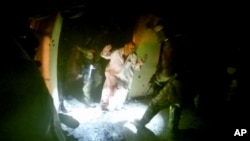Saad Khelef Ali Feraj covered his face with his hands and started sobbing.
“I can’t describe how I feel," he says. "I was dead.”
A former policeman, Feraj was one of 69 Sunni Arabs imprisoned and tortured by Islamic State (IS) militants before being freed in a joint Kurdish-U.S. military raid October 22.
In a video released by the Kurdistan Region Security Council on Monday, Feraj spoke of repeated beatings, of plastic bags being placed over his head, of his brother being beheaded and the militants giving him the head to bury.
Feraj, who said he is now safe in the Kurdistan region of Iraq, then continued: “God sent us the Counter Terrorism Forces of the Kurdistan Region and U.S. Special Forces. I thank our father and leader Masoud Barzani.”
It was a mantra repeated in different variations by all 10 freed prisoners who stood and spoke to the camera, framed by a large portrait of Barzani, Kurdistan’s regional president.
The video starts with dramatic footage of the raid, in which there are American voices, including one shouting instructions — “Hold that guy there” — and orders in Arabic for the prisoners to move quickly.
WATCH: Video of raid
It then cuts to a scene of released prisoners shaking hands with and kissing the cheeks of Peshmerga forces before sitting in rows in a large room; Barzani’s portrait hangs prominently in the back, flanked by flags of Kurdistan and Kurdistan’s Security Council.
Despite what some call clear propaganda, the video testimony is chilling.
Mohammed Hassan Abdullah, another policeman from Hawija, in the district of Kirkuk, said he was tortured with electric shocks, had a bag placed over his head until he lost consciousness, then shocked again.
“They would execute two or three or four hostages every day,” said Abdullah, his words translated in subtitles provided by the Kurdistan video.
Ahmad Mahmud Mustafa, who said he had been arrested by IS extremists multiple times, said the torture would typically continue until there was a confession. But those who confessed would then be executed. Not confessing would lead to more torture.
“They would cover our eyes and tie us with handcuffs. The first thing they did was is pour water over us, then they’d use electric shocks,” he said. “We had to say something. 'Who are you part of?' they’d ask. Torture would continue unless there was a confession.”
VOA could not independently confirm the prisoners’ accounts.
It was not clear why the men had been arrested, although Hussein Ali Alhemdani said he was arrested because he had worked for the Hawija Council, and his brother was a council member.
Saib Abdullah Msahir Aljaburi said he had been detained because he had sent his degree to the Iraqi Ministry of Defense.
The Aljaburi tribe is one of the Iraqi Sunni tribes who have fought IS militants.
Ahmed Abd Aljaburi of the Abasi district of Hawija, where the prisoners were being held, described how IS used the promise of food and money as a recruitment tool.
“For a year and six months, I had no money or job, I said I am hungry and [IS] said 'if you … swear allegiance and kill the apostate you will receive 60,000 Iraqi dinar [about $53] and gas, oil and other things.”
Abd Aljaburi also said IS militants were forcing those men with more than one wife to hand over additional wives as gifts to foreign fighters who joined the extremists.
“Either you accept or die,” he said.
Although illegal in Iraq, polygamy is part of the country’s Islamic traditions and has become more common with the increased number of war widows unable to provide for themselves.
The video concludes with a scene — set to soft piano music — of ex-prisoners, seated on a grass lawn, being handed candy, sandwiches and juice boxes by uniformed Kurdish Peshmerga forces in the Kurdistan regional capital of Erbil.
Sirwan Kajjo contributed to this report.




